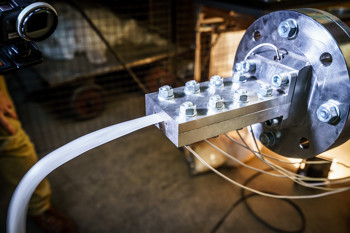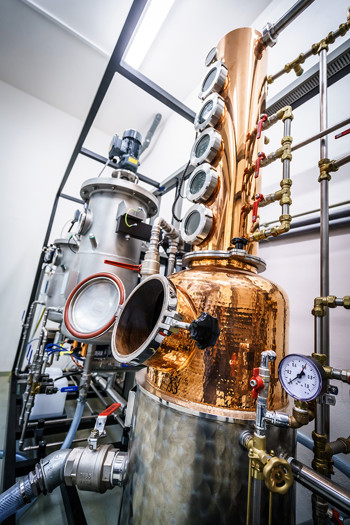Energy and process engineering
Tutor: Prof. Ing. Tomáš Jirout, Ph.D.
Energy and Process Engineering is a doctoral study programme built with regard to the needs of future employers and their
demand for highly qualified professionals capable of conducting both basic and applied research and development, converting
knowledge into reality with a focus on industries related to energy, process engineering and environmental technology.  The
presented doctoral study programme aims at educating such professionals with a particular focus on big traditional and nuclear
energy and remote heating networks, process engineering emphasizing traditional manufacturing (chemical and food), as well
as on environmental technology relating to conceptual designs and assessments of technical equipment intended for indoor environment
adjustment. Moreover, the professionals are able to turn their attention to the current and future needs of the industry and
society in areas focusing on the concept of smart sustainable decentralized energy, CCS/U technology, biotechnology and biorefineries
for waste processing, material recycling, processing of compounds with high value added, such as pharmaceuticals, biomaterials,
plastics, particle composites and nanocomposites, as well as on reducing the energy needs of environmental technology systems.
The
presented doctoral study programme aims at educating such professionals with a particular focus on big traditional and nuclear
energy and remote heating networks, process engineering emphasizing traditional manufacturing (chemical and food), as well
as on environmental technology relating to conceptual designs and assessments of technical equipment intended for indoor environment
adjustment. Moreover, the professionals are able to turn their attention to the current and future needs of the industry and
society in areas focusing on the concept of smart sustainable decentralized energy, CCS/U technology, biotechnology and biorefineries
for waste processing, material recycling, processing of compounds with high value added, such as pharmaceuticals, biomaterials,
plastics, particle composites and nanocomposites, as well as on reducing the energy needs of environmental technology systems.
 The shared basis of expertise developed during the studies is profound knowledge of fluid mechanics and thermomechanics, heat
and mass transfer, often accompanied by physical and chemical changes in studied systems, and their specific applications
in the design of comprehensive industrial systems and investment projects as well as the construction of specific equipment
having regard to material and energy reductions and minimalization of produced waste.
The shared basis of expertise developed during the studies is profound knowledge of fluid mechanics and thermomechanics, heat
and mass transfer, often accompanied by physical and chemical changes in studied systems, and their specific applications
in the design of comprehensive industrial systems and investment projects as well as the construction of specific equipment
having regard to material and energy reductions and minimalization of produced waste.
Graduate profile
Energy and Process Engineering graduates are capable of conducting both basic and applied research and development, converting knowledge into reality with a focus on industries related to energy, process engineering and environmental technology. The shared basis of the graduates’ expertise is profound knowledge of fluid mechanics and thermomechanics, heat and mass transfer, often accompanied by physical and chemical changes in studied systems, and their specific applications in the design of comprehensive industrial systems and investment projects as well as the construction of specific equipment having regard to material and energy reductions while preserving an optimal environment and to minimalization of produced waste. Development and efficient use of alternative sources of energy is another common characteristic.
 Energy studies provide the graduates with comprehensive knowledge of the production and use of energy from exhaustible, renewable
and alternative sources. They are prepared to devise technical designs of energy technology, designs and construction of specific
energy machines, equipment and systems suitable for remote as well as decentralized production units, as well as to consider
the economic and environmental perspectives of operations. Attention is also paid to the design, construction and operation
of systems for rational use of energy, particularly in the area of cooling systems, heat pumps and pneumatic and hydraulic
machinery. In process engineering, graduates gain knowledge and skills related to complex processes, technology and equipment
required for development of traditional manufacturing focused on the production and processing of primary material (chemicals,
food, raw materials) as well as for industrial implementation of the latest technology such as CCU, biotechnology and biorefineries
for waste processing, material recycling, processing of compounds with high value added (special chemicals, pharmaceuticals,
biomaterials, plastics, particle composites and nanocomposites).
Energy studies provide the graduates with comprehensive knowledge of the production and use of energy from exhaustible, renewable
and alternative sources. They are prepared to devise technical designs of energy technology, designs and construction of specific
energy machines, equipment and systems suitable for remote as well as decentralized production units, as well as to consider
the economic and environmental perspectives of operations. Attention is also paid to the design, construction and operation
of systems for rational use of energy, particularly in the area of cooling systems, heat pumps and pneumatic and hydraulic
machinery. In process engineering, graduates gain knowledge and skills related to complex processes, technology and equipment
required for development of traditional manufacturing focused on the production and processing of primary material (chemicals,
food, raw materials) as well as for industrial implementation of the latest technology such as CCU, biotechnology and biorefineries
for waste processing, material recycling, processing of compounds with high value added (special chemicals, pharmaceuticals,
biomaterials, plastics, particle composites and nanocomposites).
Environmental technology emphasizes development in the area of heating, ventilation and air-conditioning equipment, heat supply equipment, use and development of alternative sources of energy, as well as equipment for the protection and monitoring of outside air pollution and noise and vibration reduction. Environmental technology focuses on areas relating to development of modern technology and system design methods (BIM) as well as responsible energy management in technology R&D while continuously struggling for improvements in the energy performance of buildings and integrated systems.
Doctoral graduates possess profound knowledge to complete the most challenging research tasks as well as experience with the latest experimental and diagnostic methods and world-class pilot and operating equipment. This allows them to tackle complex tasks in development of new technology and equipment on a theoretical level as well as to experimentally verify their conclusions by designing and realizing experimental equipment, conducting an evaluation and producing generalized results. Given the complexity of the latest technology that the education focuses on, emphasis is placed on strengthening the links among the particular areas of the doctoral study programme as well as on fostering interdisciplinary connections on the level of related fields. Relying on this knowledge, graduates are able to comprehensively solve, objectively evaluate and formulate the attained original results of scientific research assignments. Also, they are able to present or realize the same on an international scale, taking into account intellectual property issues. Programme graduates are suitable candidates for jobs in the field of basic and industrial research and development, new technology design and implementation, and management of complex industrial systems. Other opportunities can be found in the academic sector and other institutions focused on science, R&D and innovations on the national and international level.
Admission requirements
- The fundamental condition for admission is a completed master’s degree in a field related to the thesis topic.
- Properly completed application form, submitted in due time and manner.
- Original of a proof of completed university education (i.e. diploma or diploma amendment), or a certified copy of the same, presented to the Science and Research Department of the Faculty of Mechanical Engineering of CTU, Prague.
- The entrance test is oral, mostly covering three subjects selected in a manner to allow the candidate to demonstrate knowledge of the theoretical basics of the doctoral study programme. The examination also includes oral verification of the candidate’s past professional activities, current level of language skills and orientation in the chosen thesis topic. Admission is based on a consensus of the examination board members as to whether the candidate has the capacity to successfully graduate and complete the thesis. Where multiple candidates apply for one announced topic, the board sets the order of successful applicants and recommends the first-ranking candidate for studies. As part of the admission examination and in accordance with the Study and Examination Rules, the tutor has the right to veto an admission decision in respect of a topic proposed by such tutor.
![[design/2014/cvut-logo-en-white.png]](https://fs.cvut.cz/content/images/design/2014/cvut-logo-en-white.png)
![[design/2014/cvut-logo-en-print.jpg]](https://fs.cvut.cz/content/images/design/2014/cvut-logo-en-print.jpg)